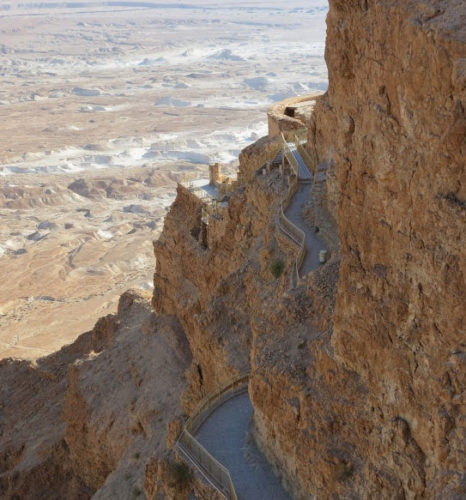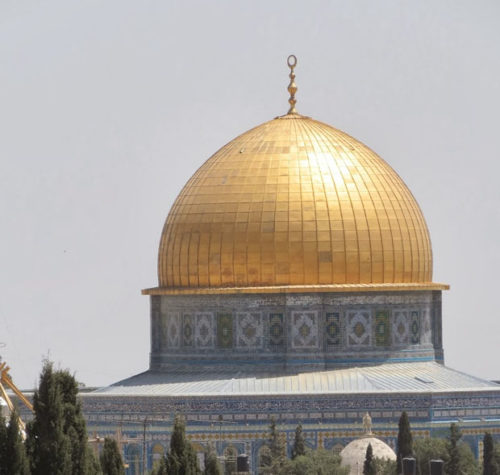It’s kind of weird how, sometimes, when the words start coming out of my fingers (translation: when I start writing) I don’t know what I’m writing about. This is especially true if it is something I’m excited or upset about.
It turns out this is actually about my longing for the Land – for Israel, for our Jerusalem of Gold.
But when the words first started coming out, I thought I was writing about how I feel about the Revelation at Sinai.
Although I’ve spent every year of my life thinking about G-d, it’s only the last 15 I’ve spent seriously thinking about the Revelation.
Why did this become important to me? Because it was the issue that almost made me decide not to do the thing that has meant the most to me – convert to Judaism.
In September it’ll be 11 years since I emerged from the mikvah a bright and shiny, not to mention wet, new Jew. But before that I spent five years learning with one rabbi after another until I finally found one who had no problem discussing the “wisdom” I read him off Starbucks’ cups.
OK, yeah, I had kind of strange criteria for relating well to Rabbis.
Anyway, my decision back then didn’t turn out to be whether I wanted to convert. Very soon after I started learning about Judaism, I felt that it was my life path. The one I had been searching for that whole life I’d spent thinking about G-d. I wanted to go into the mikvah so much I can’t even describe it.
But… I just wasn’t sure that I could.
Standing between me and my dream of mikvah was the Revelation at Sinai.
It wasn’t a question of the reality of G-d’s existence. I know G-d is there. I feel Her.*** (Sorry to anyone my choice of pronoun just offended. But if G-d is real, He/She/It has no gender, and me being a woman, I relate better to the Shechinah, the Divine Feminine, G-d the Mother.)
My issue was that I just wasn’t sure that I could honestly say that I believed absolutely that the Torah was transmitted *word by word* from G-d to Moses at Sinai.
I know that all of Judaism rests on the Revelation.
How could I convert if I was so unsure about what I thought? I wrestled with this for at least a year. Obviously, I continue to wrestle with it.
The least of my issues was whether the event happened. I accept that the Torah isn’t meant to be a history book. What was really bothering me was … word by word.
Which is all part of the larger issue of giving G-d any human characteristics. If it was a big enough problem to be an issue for Maimonides, one of the greatest philosophers ever, it was a big enough problem to be an issue for me.
Back in my hippie dippie days, there was a new age philosopher named Alan Watts. No comparison to Maimonides, of course, but he said something that I have always remembered: When you are describing G-d, if you can say it, that’s not It. He meant that G-d is so far beyond anything we can imagine that any words we use to describe G-d don’t. There is no way that they can. Words are limited, and they just can’t describe an unlimited being.
It always seemed to me disrespectful, at the very least, to think of an unlimited being as “speaking”; implying the existence of something as limiting as a mouth and that they would communicate using something as imprecise as words.
And even if I got past all that, G-d sitting down and dictating was completely beyond what I could imagine.
But full disclosure, this is coming from someone who thinks she feels the Divine Feminine. Of course, if I heard actual words coming from Her, I’d call the nice, young men in the clean, white coats myself.
Maybe this is just *my* failure of imagination. Still the Torah says this about what the people experienced:
All the people witnessed the thunder and lightning, and the blare of the horn, and the mountain smoking; and when the people saw it, they fell back and stood at a distance. “You speak to us,” they said to Moses, “and we shall obey; but let not G-d speak to us, lest we die.” (Exodus 20:15-16)
The verse is translated with the word “speak”. But it ends “Lest we die.”
Would words be that intense? I can imagine direct communication with G-d being that overwhelming. But words?
Even after all the years and all the thinking, the uncertainty remained.
Given the continuing uncertainty, and the importance I placed on Sinai, you may be wondering how I was able to allow myself to convert. I decided to convert as a Conservative Jew.
Standing before a Conservative Beit Din, I did not have to swear to this: I believe with complete faith that the whole Torah which we now possess was given to Moses… (part of the Thirteen Articles of Faith of Maimonides)
Conservative Jews congratulate themselves on the fact that they can live with the uncertainty. I can’t say that living with it made me proud, but it did allow me to convert. I am grateful for that, but the issue didn’t stop haunting me.
I have teachers whose belief and learning is at a much higher level than mine. And they tell me that nothing happens in the world that doesn’t happen exactly as G-d intends. There are no coincidences. I admit, I’m not always as certain about that as they are.
But I do seem to have run into a curious series of “coincidences” in the last few days.
A brilliant Rabbi that I know, and his equally brilliant Rebbetzin, independently and within 24 hours of each other, said things that altered my thinking:
He said: When you buy a present for someone you truly care for, are you not putting your feelings into a physical form?… The world, the universe, a tree… are all a gift from The Almighty G-d who loves you. Can’t you feel and see [that] love?
If you [can accept] that an Infinite Being can reduce their thoughts and feelings into a tree, then why not [into] a word? After all, a tree is just an expression of the thoughts of God. Those thoughts can be explained in words. And those words can be spoken.
And she said: Moses got the [words of the] Ten Commandments at Sinai. And he got the overview of the entire Torah there. But he didn’t get all the specifics. And it took him years to write it all down.
(She also used the word “dictate” which makes me squirm, but right now I’m going to leave that alone.)
What I really wish is that I had heard these things earlier. Wondering about the Revelation has been a long, sad, silent and mostly un-shared experience.
And even though what these two people said makes it easier for me to accept the idea of G-d using words, I’m still not 100% certain about what happened at Sinai. But hearing them made my discomfort go way down. It opened me up for a new way of thinking about this going forward. And I will be thinking about it.
In many ways I envy all the folks who have no doubts and are completely convinced that the Revelation happened exactly as it is written in Torah.
And yet, the simple truth, *my* simple truth, is that I honestly don’t care if Sinai was a historical fact. It may be. I hope it is.
I know. Believe me, I do know. How can I be a Jew and not care?
Because here is what I’ve learned from struggling with this over the years. Here are the things I am willing to say that I know.
I know with complete certainty that G-d exists. I know with complete certainty that what is most important in my life is for me to become closer to G-d. And I know with complete certainty that living a Jewish life is the path for me to do that.
Remember way back at the beginning when I said this is about my longing for the Land? It actually is about that.
As I said, the basis of my decision to convert as a Conservative Jew was my struggle with what really happened at Sinai. And I could NOT lie about something that meant so much to me.
At the time, I didn’t realize some of the consequences of that decision.
It took me most of the way through writing this to realize that my real motivation for starting was that I was SO angry with the Israeli Chief Rabbinate after reading about their last set of rules about conversion and converts and the political battles that are being waged in the Knesset.
I was indignant. Who are they to judge me as a Jew? To just write off whole groups of people they know nothing about? To deny me entry into my own homeland?
I wanted to hole up in Masada and fight them for my right to be there.
When I was whining about this, one of my friends said: If Judaism is going to survive, there must be rules, and someone has to keep track of them. I wasn’t happy about what she said, but I acknowledge that she may well be right.
However, that did not make me any less upset.
And I opened my eyes the next morning thinking this: The Chief Rabbinate may be the keeper of the rules and perhaps it needs to be. And, of course, they can’t evaluate every individual convert.
Still…
My mind.
My heart.
My soul.
My body.
Everything that I am – turns toward the Divine like a lodestone and burns with a fierce, fiery need to move closer to that Divinity… as a Jew.
I know now that my conversion by a Beit Din of three respected Conservative Rabbis may never be considered acceptable in Israel. Legally, I can make Aliyah, but I won’t be considered a Jew within Israel. I don’t care about being able to marry and I have no children’s futures to consider. But it turns out, I do care that it means that I may never be buried as a Jew in Israel.
But I also know this with complete certainty: even though I may never be buried as a Jew in Israel, I will die a Jew… the Shema on my lips.
And nothing the Chief Rabbinate says or does will change that. Nothing.
More important even than that, I will live as a Jew. There is nothing they can do about that either.
I know I’m not the only sincere convert out here who will be rejected under the “rules.” And, it’s only my opinion, but I think it will be the Jewish people’s loss if no way is found to figure out who we are and how to accept us… under the “rules.”
The computer where I write is by a window and I’m watching the rain roll down the screen outside. A few tears have been falling as I write this, so desperately do I long for Israel, but I am comforted because I feel the Shechinah is crying with me, sharing my sorrow.
As well as showing me a truth in the Rabbi’s words. Although *I* hear no words, She does communicate, even with a simple member of Yisrael like me.
Perhaps… with a great prophet like Moses… communication could have been… in words.
Something for me to think about.
Credits:
Statue of Moses: Giovanni Dall’Orto, Public Domain
Masada and Jerusalem: Lori Wasserman, 2012







